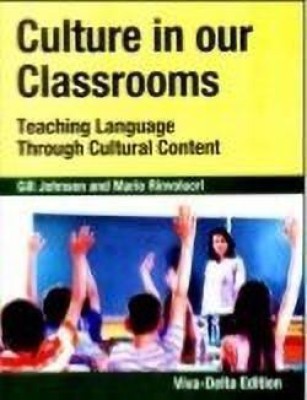Culture in Our Classroom(English, Paperback, Johnson G.)
Quick Overview
Product Price Comparison
Culture in our Classrooms acknowledges the role of culture in the English Language Teaching classroom and provides lesson content which is relevant, useful and engaging for students. Over 80 practical and easy-to-use communicative activities will help your students: become aware of the target-culture norms and behaviours understand better their own and other beliefs and values see beyond stereotypes and empathise with other cultures Culture in our Classrooms contains three distinctive parts which focus in turn on theory, practice and development: Part A examines definitions of culture. The authors examine the beliefs behind behaviours, and reflect on the inextricable link between culture and language - suggesting that culture as ŌĆśclassroom contentŌĆÖ involves students on many levels, enabling them to communicate about something deep, compelling and worthwhile. Part B contains a wealth of activities which encourage critical thinking in students and communication between students. They involve students in reacting and reflecting, sharing and comparing - and are grouped into four chapters which foster cultural awareness, focus on the cultural connotations of language, formulate thinking frames for study and, finally, fix their attention on an English-speaking country. Part C approaches culture in the context of Teacher Development and provides 16 practical exercises for staffroom sessions. The exercises span four major skill areas for personal and professional improvement - observation, listening, rapport building and empathy. About the Author Gill Johnson is a teacher and a trainer. She is a mentor in the UK secondary school sector, a CELTA trainer and assessor and she has worked regularly in four continents. An outsider looking in, an insider looking out; observing and being observed; judging and being judged - all of which has contributed to Culture in our Classrooms. Mario RinvolucriŌĆÖs contact with cultural diversity started early in his Italo-Germano-English home. Three years in Greece and two in Chile brought him up against new aspects of this huge area. In the UK, his students have come from all over the world - creating the personal and professional background to this book. Table of Contents Part A References and further reading Part B Activating cultural awareness Cultural categorizations My story Who are you, teacher? The ideal student What embarrasses you? The world as I see it Beliefs behind behaviours Images in different cultures Symbolic movements Red card behavior Groups I belong to Racist, me? Me and my culture Breaking rules Success stories Things I like The best day of the year Two women and a funeral Buffer zones Looking through windows Identikits Take comfort! Shall I Pour? Teenage work Parental dos and donŌĆÖts To sleep, perchance to dream Rules for life All change! Words, metaphors and stories A lesson I learned Gender words Snakes in the bushes No bushes, no snakes One womanŌĆÖs story The quality of silence The sound of silence Classy meals Middle-class assumptions Note the difference GrandpaŌĆÖs story Woolly words New words for new times TV talk National anthems Frames for studying culture On course! Onion ring culture Cultural concepts This is my life! Culture statues My values, your culture Culture words Icebergs Our house Four-way states of mind Talking and turn taking time is of the essence Culture construction A mind map of Europe The question of health Codes of conduct Walk on the wild side Buy now, pay later! The printed word We and they Spotlight on the UK Nice neighbours! How annoying! A scene on a train Stop picking on me! What strikes you in a strange culture The confusion of culture shock On target! How I map my country DonŌĆÖt let me be misunderstood Worlds apart? Public notices Strange sounds Co-operative comments Questions of attitude The prince and the pauper Four ways of complaining Softening what you say House rules Learning from the host family Institutions and the internet UK quiz Part C Observation In-depth listening Rapport building The otherŌĆÖs shoes


